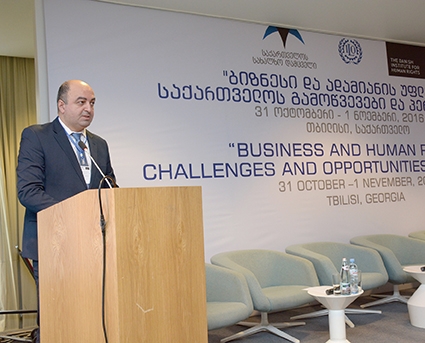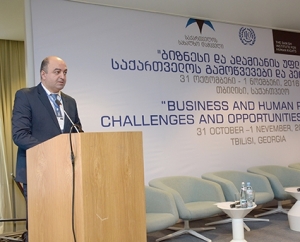Safety at Work: the Dialogue Begins
When a 63 year old railway worker died on October 27 after he had his leg run over by a train in southern Georgia, it counted the third death in a work accident that month. Prior to this a construction worker fell to dead in Tbilisi and at the beginning of the month a worker was found dead in the Mindeli coal mine in Tkibuli. He was presumably poisoned by toxic gas.
This casualties raised a discussion about safety in the workplace and the prevention of such accidents. The main demand is for the re-introduction of the labor inspectorate which was abandoned in 2006.
“Effective labor inspections, together with clear and modern safety standards, could help prevent such deadly accidents,” said the Public Defender (Ombudsman) of Georgia in a statement followed the October casualties which lead to an accusation that the government was not taking sufficient measures.
The Office of the Public Defender is working directly with the parties involved for improvements. At the beginning of this month it organized, with the help of the non-governmental organization Danish Institute for Human Rights, a conference about Business and Human Rights which included working conditions and labor safety. The aim was to bring the different stakeholders together: non-governmental organizations and representatives of the government, trade unions and the employers’ associations – only the latter failed to attend.
Business and Human Rights includes a wide range of aspects: minimum wages, equal payment for men and women and protection against unfair dismissal. But for Georgia the most important issue is likely the introduction of an effective labor inspection – a point mentioned by different participants at the conference and particularly by the International Labor Organization (ILO), a specialized agency of the UN also present at the meeting.
An appropriate labor inspectorate includes not only enough well-trained inspectors but also a comprehensive mandate, the possibility to apply sanctions against a company and a form of organization which prevents corruption. The Ministry of Labor, Health and Social Affairs has already started the process to create such a labor inspectorate again and a pilot project with 25 labor inspectors trained by the ILO is in operation.
Elza Jgerenaia, Head of the Labor and Employment Policy Department in the Ministry of Labor, Health and Social Affairs, told GEORGIA TODAY that the legislation proposal is ready to be discussed in parliament.
“It will improve the working conditions, especially in professions with physical work, e.g. on construction sites or in the heavy industries,” Jgerenaia said. “The companies have to appoint a responsible person for health and safety, and they have to report on the working conditions.”
Jgerenaia hopes that the newly elected parliament will soon start discussion about the proposal.
“The question of minimal salaries is also to be addressed,” said Jgerenaia. “A tripartite commission including representatives of the employees, the employers and the government will discuss this issue at their next meeting planned for December.”
The commission has existed since 2013 but will only start to really function this year as a potential effective instrument for social partnership in Georgia.
Concerns also exist about the plans of the government to create and implement a National Action Plan on Business and Human Rights. Several participants at the conference stressed the importance that the stakeholders, including the government, believe in the action plan and understand the responsibility which comes along with it.
Lukas Mäder











